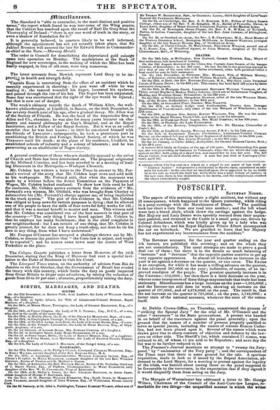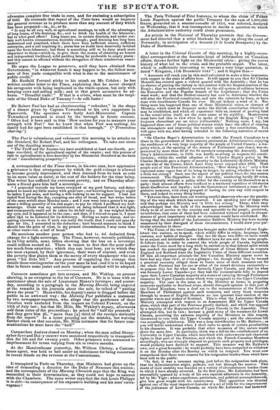The Marquis of Westminster has addressed a letter to Mr.
George Wilson, Chairman of the Council of the Anti-Corn-law League, re- markable for twO things—the unqualified manner in which the writer advocates complete free trade in corn, and for enclosing a subscription of 5001. He contends that repeal of the Corn-laws 'would so improve the general revenue as to produce more than any amount of duty which has been proposed-3s., 5a., or Ss. " lt may be all very well, at agricultural meetings, to talk of the advantages of long leases, of tile-draining, &c., and to drink the health of the labourers; but to what good effect? Long leases are, in certain districts, and under cer- tain well-known circumstances, desirable enough; good draining has long been understood and practised, where there have been sufficient means, sufficient enterprise, and a soil requiring it ; praise has no doubt been deservedly lavished upon the farm-labourers ; but there is something still to be done much more important to them—which is, to give them the means of obtaining an honest and independent livelihood, solid pudding being far preferable to empty praise : and this cannot be effected without the abrogation of these mischievous enact- ments."
He urges the League to persevere, until they have obtained from Government, "in whatever hands it may happen to be, the fullest mea- sure of free trade compatible with what is due to the maintenance of public credit."
Mr. Busfield Ferrand sticks to his attack on Mr. Cobden : he has written another letter to the Times, explaining that he never charged his antagonist with being implicated in the truck-system, but only with keeping cows and selling milk ; and to that grave accusation he ad- heres. "Dreadful trade!" If that is a crime, what must be the turpi- tude of the Grand Duke of Tuscany ?—he sells butter































 Previous page
Previous page